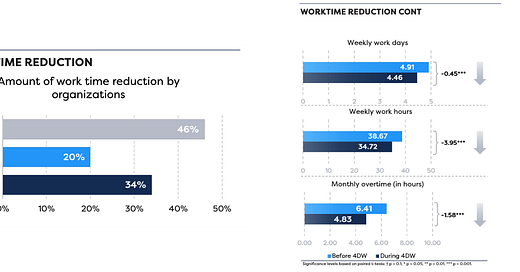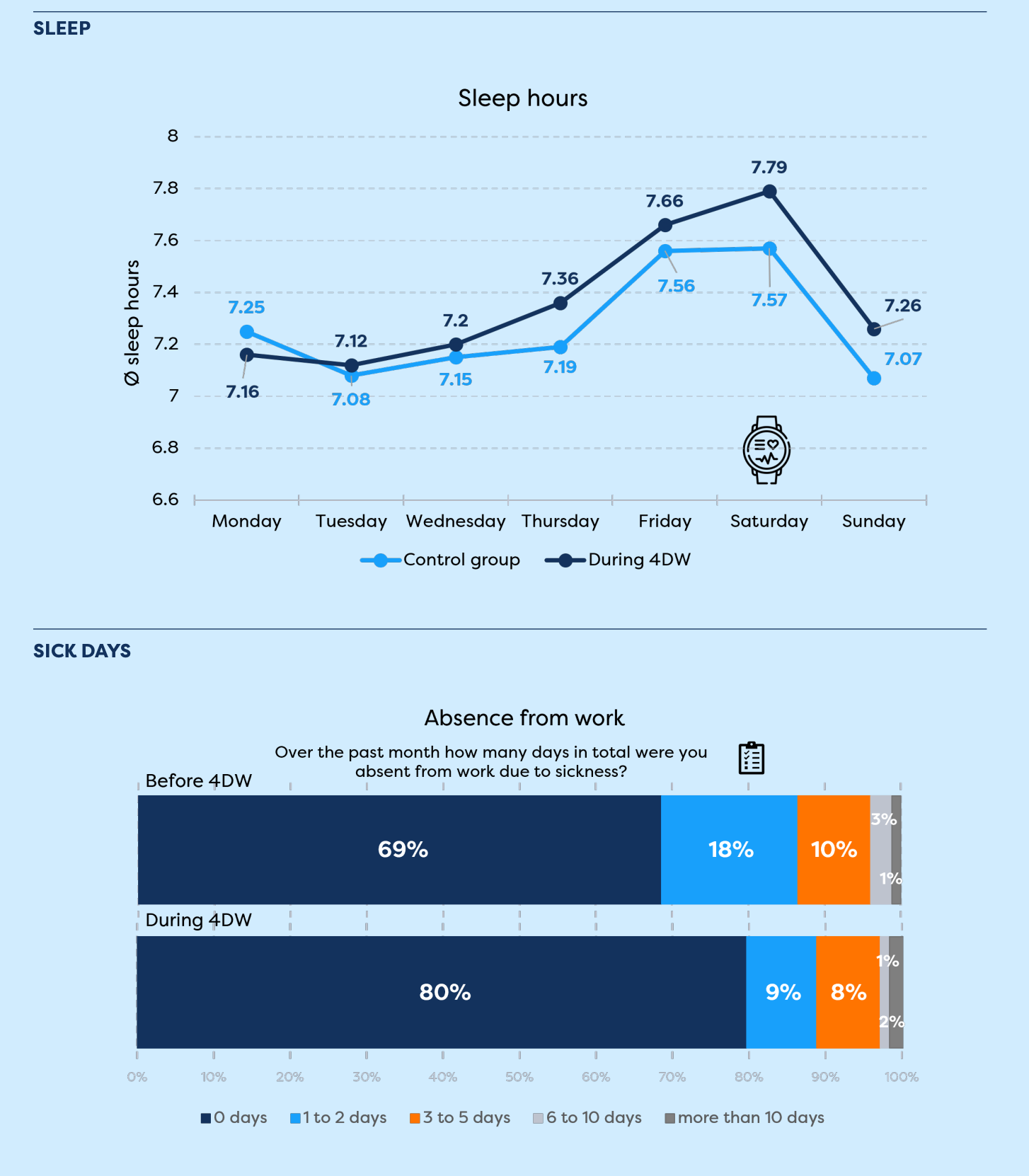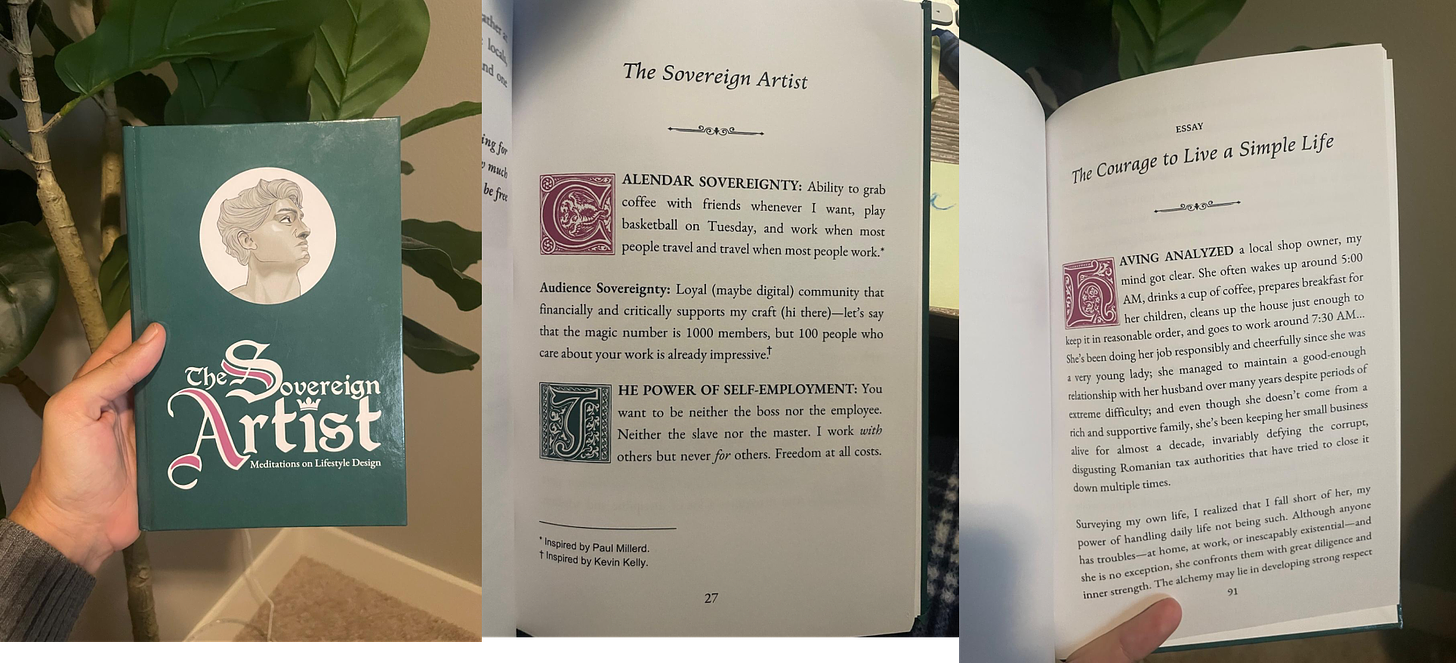November 2, 2024: Greetings from Austin! It’s nice getting back to a somewhat regular rhythm with the newsletter and sharing whatever I’m coming across in my reading. Enjoy!
This newsletter is sponsored by my two books The Pathless Path and Good Work as well as The Pathless Path Community (join us and meet others on weird paths!).
#1 Germany’s Four-Day Workweek Experiment
A couple of weeks ago, I wrote about how Friday has become a de-facto stay-at-home day at most companies in the US. My gut tells me that in ten years, Friday may disappear as a workday altogether.
Recently, they ran an experiment in Germany with 45 companies shifting to a four-day workweek for six months. The report is worth skimming through but I thought I’d share some of the charts that stood out.
First: work hours. Germany’s hours are already low relative to other countries so I wasn’t surprised to see only minor drops in weekly work hours. Almost half the companies only reduced the working time by less than 10% and the average work hours per week dropped by about four hours:
Next: performance. Revenue and profit didn’t seem to take a hit (though having a control group for this experiment is impossible) though people did feel as if they were working more intensely.
Finally, on the health front, people seemed to sleep more and also skip work much less. Absenteeism is an expensive issue at many companies, so for certain industries, this move could be a lot more valuable.
Finally, about 83% of people wanted to continue the experiment or were inclined to support it (though I wish they had quotes from the 9%, what made them want to go back?!).
And shoutout to the newly converted 13% that wouldn’t convert back to a 5-day week at any cost.
Here’s a direct link to the PDF.
+ Also, I wrote an essay about this in 2019.
#2 Labor Economies & Quality of Childcare
A new paper argues that having a strong labor economy means talented people will select out of jobs like childcare, leading to a lower overall quality of the childcare workforce. Here’s the abstract:
I also show that the relative quality of the child care workforce is declining, in part because higher-skilled individuals increasingly find the child care sector less attractive than other occupations.
Furthermore, I provide evidence that at least three other factors may be associated with the decline in worker quality.
First, the recent proliferation of community college programs offering child care-related certificates and degrees may divert students away from attending four-year schools.
Second, those majoring in child care-related fields are negatively selected for their cognitive skills, thereby decreasing the quality of the child care labor pool.
Third, I show that the increased availability of outside employment options for high-skilled women had a detrimental effect on the quality of the child care workforce.
It’s. very clear this is happening not just in terms of quality but simply the availability of childcare in the US. This is one of the reasons we’ve just been watching our daughter ourselves. Some of the wait times require parents to apply for daycares before they even become pregnant.
#3 A town in Japan where 47% of people have three or more kids.
After the town decided to avoid merging with a nearby city, they implemented a number of policies that would support children.
Children receive free healthcare up to the age of 18 and families don’t pay a single yen for school textbooks until they complete compulsory education at 15. School meals are subsidised, and teenagers attending senior high school out of town pay only a fraction of their bus fares. In an attempt to attract young families, the town offers three-bedroom homes for a comparatively low monthly rent of ¥50,000.
In a country with a birth rate of 1.2 kids per women, I found this impressive. I suspect Japan and other East Asia countries will be much more aggressive with these kinds of experiments in the coming years (and maybe the West slowly following).
#4 Links & Other Things Worth Sharing
Soveraign Artist: Thank you to Vizi Andrei, who sent me a copy of this thoughtful personal reflection on his idea of what he calls the “Sovereign Artist.” The book was a weird and fun collection of essays, personal thoughts, aphorisms, quotes and inspiration. It gave me some ideas about doing something like this in the future.
Life Design Course: Another internet friend, Alice Katter, who also published a book called Reimagining The Future of Work, is running a 12-week “designing your life course.” I have no plans to run something like this in the near future, so if you are interested you can check it out here.
Reflections From Japan: I enjoyed this video essay - it details a toilet cleaner who is living a life in which he feels satisfied (thanks for sharing Dylan):
#5 Book Update
Good work has hit the 1k books in 100 days benchmark (often seen as a way to reach enough readers to hit a tipping point to eventually spread) in less than 40 days.
Here is some of the results from 44 days (taken on Thursday)
Overall
Days since release: 44 days
Total books sold: ~1216
Royalties (est): $7836
Amazon
Books sold: 1,045
Royalties: $7,105
Apple:
Books sold: 24
Royalties $165
Audible
Audiobooks sold: 139
Royalties: ~$486 (est)
Ingramspark
Books sold: 10 (lag on ebook sales)
Royalties: ~$80
Fun fact: The Pathless Path has sold the same number of copies as Good Work since it launched on September 17th: 1216 (622 on Amazon + 131 + 428 audiobooks + 35 ebooks)
Some recent reader reviews (mostly real)
Maria: “I'm not even halfway through Good Work, and it's already making me want to record music and write a book”
David: “Paul’s new book is excellent”
Matt: “Great Work” (his full review)
Ben Franklin: “A banger”
Hey! Thanks for reading…
I am not sure how you ended up here but might have stumbled upon me through my writing or podcasting on our relationship to work, a topic that has interested me for years.
If you don’t enjoy the writing, I strongly encourage you to unsubscribe below. There’s so much good stuff on the internet!! A reminder: I don’t check unsubscribe alerts and never look at my subscriber list. So if you feel like unsubscribing, you can do so below.
But if you do want to stick around:
If you’d like to meet others on “pathless paths”, you can join The Pathless Path Community
Buy or listen to my books, The Pathless Path and Good Work. If you’d like to do a bulk order you can do that here for a discount or email me. I love gifting my book to conferences, events, and coworking places.
You can buy pathless path swag like a hat or shirt here
Subscribe to my podcast and leave a review.
Home Swapping: We’ll likely be using Kindred a bit this winter. It’s a pretty cool home-swapping alternative to Airbnb. If you want to join, use my signup code.
5% Savings: Use this link to get 5% on your savings on Wealthfront and increase your runway on your pathless path
Affiliates: In addition, I recommend all of the following services: Ali Abdaal’s YouTube Course, Collective for setting up an S-Corp in the US (recommended >$60k revenue), Riverside.fm for HD podcasting, Transistor for podcast hosting, Podia or Teachable for courses, Skystra for WordPress Hosting, and Circle for running a community.





















Shoutout to Ben Franklin for the blurb 🤘🏼
Loved reading this especially about the 4-day week. 🙏🏻
I'm a massive advocate for it and it's not talked about how Friday is basically a 'write-off' for many knowledge workers.
I think in the UK at least, people feel though they're 'paid anyways' for what's considered an easy day - and fear the 4 day conversation will only result in less pay for similar overall work.